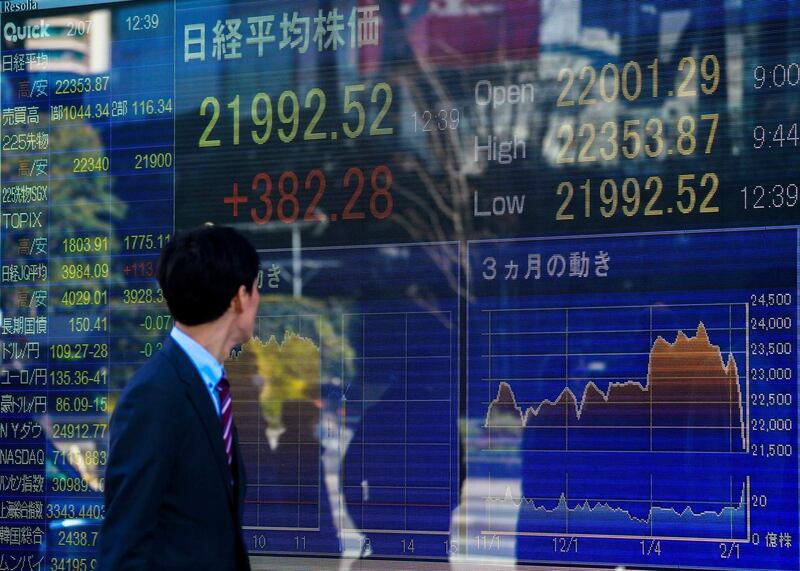Asian equity markets recovered some of the losses sustained in the global rout after US shares rallied amid a welter of calls to “buy the dip”.
Treasury yields fell after climbing on Tuesday.
Japan’s benchmarks advanced, although pulled back from the morning session’s highs, as S&P 500 Index futures declined and Chinese shares dropped, suggesting the recovery isn’t yet on solid ground. Volatility on the Nikkei 225 Stock Average subsided after the Cboe Volatility Index sank almost 20 per cent. The yen and gold edged higher. A topsy-turvy session for the S&P 500 Index advancing 1.7 per cent on Tuesday.
“The pullback may be considered a healthy correction,” said Candice Bangsund, a fund manager in Montreal at Fiera Capital, which oversees more than $128 billion. “The favourable conditions that have underpinned the stock market rally over the last year remain largely intact at this time - the global expansion continues and corporate earnings remain in acceleration mode.”
_______________
Read more:
US stocks make up for some loss in another roller-coaster day
Saxo Bank equity expert says too early to predict bear market
_______________
The sharp sell-off in stocks around the world that started last week and accelerated this week can be explained by a multitude of factors from concerns over the path of US monetary policy to a rapid unwinding of trades predicated on continued low volatility in markets. Traders are now watching whether this rally can be sustained after the slump left markets from Europe to Japan in technically oversold territory.
Goldman Sachs Group's chief strategist was among those saying it's time to buy US stocks.
Bitcoin traded around $7,700 after at one point sinking below $6,000 for the first time since October. Gold rose 0.4 per cent to $1,329.82 an ounce.
Meantime, oil rose after three days of declines as an industry report was said to show an unexpected decline in US crude stockpiles. The American Petroleum Institute was said to report US crude stockpiles slid 1.05 million barrels last week, with storage also shrinking at tanks in the key hub of Cushing, Oklahoma. Nationwide inventories probably rose by 3.15 million barrels, according to a Bloomberg survey before a report from the Energy Information Administration due on Wednesday.
Oil:
West Texas Intermediate for March delivery rose as much as 79 cents to $64.18 a barrel and traded at $63.88 as of 11.39am in Singapore. The contract fell 76 cents to $63.39 on Tuesday. Total volume traded was about 16 per cent above the 100-day average.
Brent for April settlement rose 46 cents to $67.32 a barrel on the London-based ICE Futures Europe exchange, snapping a three-day decline. The global benchmark crude traded at a premium of $3.73 to April WTI.
Markets:
- Japan's Topix index advanced 2.3 per cent after the midday break in Tokyo following a gain of as much as 3.5 per cent. The Nikkei 225 climbed 1.8 per cent.
- Australia's S&P/ASX 200 Index rose 0.9 per cent.
- Hong Kong's Hang Seng Index added 1.2 per cent. The Shanghai Composite Index fell 0.8 percent and the CSI 300 Index lost 1.1 per cent.
- Futures on the S&P 500 fell 0.7 per cent. The underlying measure gained 1.7 per cent Tuesday.
- The MSCI Asia Pacific Index climbed 1.5 per cent.
Currencies:
- The Bloomberg Dollar Spot Index fell 0.1 per cent.
- The yen added 0.2 per cent to 109.29 per dollar.
- The euro traded at $1.2390, up 0.1 per cent.
- The pound rose 0.1 per cent to $1.3965.
- The Aussie dollar fell 0.3 per cent to 78.82 US cents.
Bonds:
- The yield on 10-year Treasuries fell two basis points to 2.78 per cent after climbing nine basis points Tuesday.
- Australia's 10-year yield rose four basis points to 2.87 per cent.





